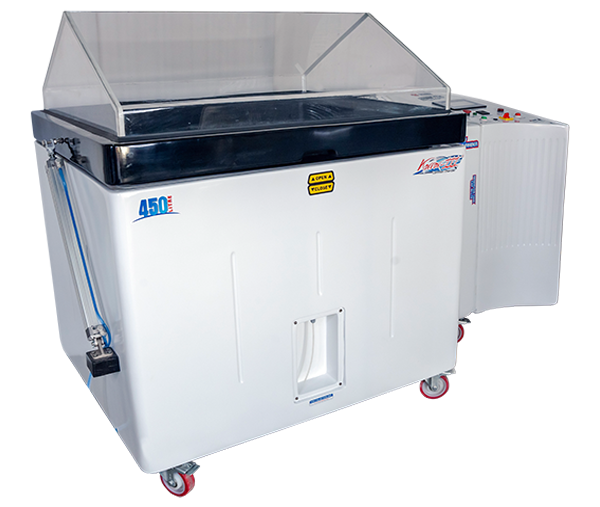In industries like automotive, aerospace, electronics, and manufacturing, ensuring that materials and products can withstand harsh environmental conditions is critical for their longevity and performance. Corrosion is one of the biggest threats to the durability of materials, especially those exposed to salt, humidity, and extreme weather. To simulate these challenging conditions and test how materials hold up, manufacturers turn to a Salt Spray Chamber. But what exactly is a Salt Spray Chamber, and how does it help in testing corrosion resistance? Let’s dive into the details.
What is a Salt Spray Chamber?
A Salt Spray Chamber, also known as a Salt Fog Chamber, is a laboratory testing device used to simulate the corrosive effects of salt-laden environments on materials, such as metals, coatings, and other substances. The chamber is designed to create an accelerated testing environment where materials are exposed to a fine mist of saline solution, simulating the corrosive effects of saltwater exposure that materials may experience in real-world conditions like coastal areas or areas that use road salt in the winter.
How Does a Salt Spray Chamber Test Corrosion Resistance?
The primary goal of a Salt Spray Chamber is to assess the corrosion resistance of materials or coatings under accelerated conditions. Here's how the process works:
- Saline Solution Preparation: The chamber uses a salt solution, typically made by dissolving sodium chloride (NaCl) in water. This solution mimics the salty environment materials encounter near oceans, roads, or industrial areas.
- Exposure to Salt Mist: Once the material or sample is placed inside the chamber, a fine mist or fog of the salt solution is sprayed over it for an extended period. The chamber is heated to maintain high humidity levels, which mimics the combination of salt exposure and moisture in real-world conditions.
- Environmental Control: The chamber is often equipped with temperature and humidity controls, ensuring that the test conditions simulate the exposure a material would face in environments with fluctuating temperatures and high moisture. This simulates the conditions that could lead to rust, oxidation, and degradation over time.
- Testing Duration: The duration of the test can vary depending on the type of material and the standards being followed. While real-world exposure could take years to cause visible corrosion, a salt spray chamber accelerates this process, providing insights into a material’s long-term durability in just a few weeks or months.
- Evaluation of Results: After the test is completed, the material is examined for signs of corrosion, such as rust, pitting, or surface degradation. This allows manufacturers to evaluate the effectiveness of protective coatings, treatments, or material choices.
Why is Salt Spray Testing Important?
Salt Spray Testing is crucial for industries where products are regularly exposed to corrosive environments. Here are a few reasons why this testing is essential:
- Product Durability: Corrosion is a leading cause of failure for many products, especially those made from metal. Using a Salt Spray Chamber helps identify how well materials or coatings can resist corrosion over time, ensuring the product's durability in real-world conditions.
- Coating and Material Performance: The testing helps manufacturers evaluate the effectiveness of protective coatings, such as paints, galvanization, or anodization, in preventing corrosion. It also provides insights into whether alternative materials or treatments are necessary to enhance the corrosion resistance of a product.
- Compliance with Industry Standards: Many industries, including automotive, aerospace, and electronics, have strict corrosion resistance standards. Salt Spray Chamber Testing is often a requirement to comply with regulations such as ISO 9227 and ASTM B117, which define the conditions and duration of salt spray tests.
- Cost Savings: By identifying potential corrosion issues early in the product development cycle, manufacturers can save on repair costs, warranty claims, and product recalls. Testing materials before mass production ensures that only the most durable products make it to market.
- Customer Satisfaction: For manufacturers, ensuring the reliability and longevity of products directly affects customer satisfaction. Products that resist corrosion, particularly in harsh conditions, have longer lifespans, reducing maintenance needs and improving consumer confidence.
Applications of Salt Spray Testing
Salt Spray Testing is used in many industries to ensure the durability of various products, including:
- Automotive Industry: Parts like body panels, exhaust systems, and engine components are subjected to salt spray testing to ensure they will resist rust and deterioration from exposure to road salts and environmental moisture.
- Aerospace Industry: Aircraft parts and components are tested for corrosion resistance, ensuring they can withstand the corrosive effects of saltwater exposure, especially for those operating in coastal or marine environments.
- Electronics Industry: Electronic devices and circuit boards are often exposed to humidity and corrosive substances. Salt spray testing ensures these products maintain their performance and safety over time.
- Marine Industry: Products exposed to saltwater, such as boat parts, shipping containers, and offshore equipment, are regularly tested to ensure their resistance to salt-induced corrosion.
- Construction and Infrastructure: Steel reinforcements, structural supports, and coatings used in buildings or bridges are tested to withstand exposure to salty air or water, preventing rusting and deterioration.
Conclusion
A Salt Spray Chamber plays a critical role in evaluating the corrosion resistance of materials, coatings, and products in a controlled, accelerated environment. By simulating the corrosive effects of saltwater exposure, it helps manufacturers assess how well their products will stand up to harsh conditions, ensuring durability and reliability. Whether in the automotive, aerospace, electronics, or marine industries, salt spray testing helps improve product design, enhance material performance, and reduce maintenance costs, making it an essential tool for ensuring product quality and customer satisfaction.
Email :- [email protected]
Call Now: +919210903903





Comments